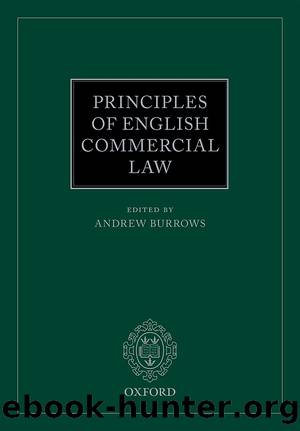Principles of English Commercial Law by Unknown

Author:Unknown
Language: eng
Format: epub
Publisher: Oxford University Press, Incorporated
Published: 2016-12-02T05:15:10+00:00
C. Payment Methods
(1) Cheques
(a) Definition
6.57 Section 73 of the Bills of Exchange Act 1882 (BEA) defines a cheque as a bill of exchange drawn on a banker payable on demand, and, except as otherwise provided in Part III of the BEA, the provisions of that Act applicable to a bill of exchange payable on demand apply to cheques. A bill of exchange is an unconditional order in writing, addressed by one person to another, signed by the person giving it, requiring the person to whom it is addressed to pay a sum certain in money on demand or at a fixed or determinable future time to or to the order of a specified person, or to bearer.195
(b) Functions
6.58 A cheque is capable of performing two different functions. The first is a payment function enabling the drawer of the cheque to instruct his bank to make payment to himself or a third party, and the holder to obtain payment from the drawer. The second is a transfer and negotiation function enabling title to the cheque to be passed by transfer from person to person and for the transferee to enforce his rights under the cheque free from any defects in title of the transferor.
6.59 The payment function is the most important function of a cheque.196 Modern banking law and practice means that virtually all cheques issued in the UK since 1992 are crossed cheques marked âaccount payeeâ or âaccount payee onlyâ which makes the cheque non-transferable and, therefore, non-negotiable.197 Most of the law relating to negotiability and indorsement is irrelevant to the typical modern cheque and is not considered in this chapter.198
(c) Cheques as payment instructions
(i) Basic rules
6.60 A cheque constitutes the customerâs mandate to his bank to make payment from his account. The rules relating to honouring the customerâs mandate are considered in 6.19 to 6.39 above and are relevant in this context. Three rules merit repetition. First, the bank is only obliged to honour a cheque drawn on its customerâs account where there are sufficient funds in the account to meet the whole of the amount of the cheque or where the cheque is within an agreed overdraft facility.199 Secondly, the cheque must be signed by the customer or other mandated signatory. A forged or unauthorized signature is âwholly inoperativeâ,200 which means that where the drawerâs signature is forged or unauthorized the bank cannot debit the account. In some cases the customer may be estopped from raising the fraud against the bank,201 in other cases the bank may be able to rely on the fact that the customerâs negligence allowed the fraud to take place.202 Thirdly, a cheque can be countermanded under section 75 of the BEA.203 The bank must receive the countermand in time for it to refuse payment of the cheque.204
(ii) Crossed cheques
6.61 A cheque is crossed when two parallel transverse lines are drawn across its face. This is a general crossing and means that the cheque must be presented for payment through a bank account.205 The holder of the cheque cannot present it in person for cash.
Download
This site does not store any files on its server. We only index and link to content provided by other sites. Please contact the content providers to delete copyright contents if any and email us, we'll remove relevant links or contents immediately.
The Social Psychology of Inequality by Unknown(2311)
The Plant Paradox by Dr. Steven R. Gundry M.D(2040)
The Writing on the Wall by Anselm Jappe(1759)
Working for Yourself by J.D. (Nolo) Stephen Fishman(1478)
Every Landlord's Legal Guide by Janet Portman & Stewart Marcia & Ralph Warner(1325)
The First 20 Hours: How to Learn Anything ... Fast by Kaufman Josh(1304)
ADHD on Trial by Michael Gordon(1241)
Decisive by Chip Heath(1201)
Drafting Contracts: How and Why Lawyers Do What They Do, Second Edition by Stark Tina L(1171)
Working for Yourself by Stephen Fishman J.D. (Nolo)(1139)
The Economist Aug 8th 2015 by The Economist(1123)
Restitution by Restitution(1115)
The Economist Aug 29th 2015 by The Economist(1097)
A Practical Guide to International Arbitration in London by Hilary Heilbron(1084)
Intellectual Property Strategy by John Palfrey(1082)
The Lord of the Rings: The Fellowship of the Ring, the Two Towers, the Return of the King by J. R. R. Tolkien(1082)
Collusion by Luke Harding(1045)
Persuasion by Owner(1012)
Chapter 1 by Owner(950)
